A reliable hospital phone system is essential for effective internal and external communication. More than 88% of hospital appointments are booked and scheduled by phone. Beyond that, nurses call patients to deliver test results. Whether communicating with the patients outside or between the doctors, nurses, and wards internally, an efficient phone system is crucial for healthcare organizations. So, it is important to invest in the right hospital phone system. In this blog, we have curated the important features, pros, cons, and pricing of the top 11 healthcare phone system providers so you can pick the one that goes well with your requirements and expectations.
What is a Hospital Phone System?
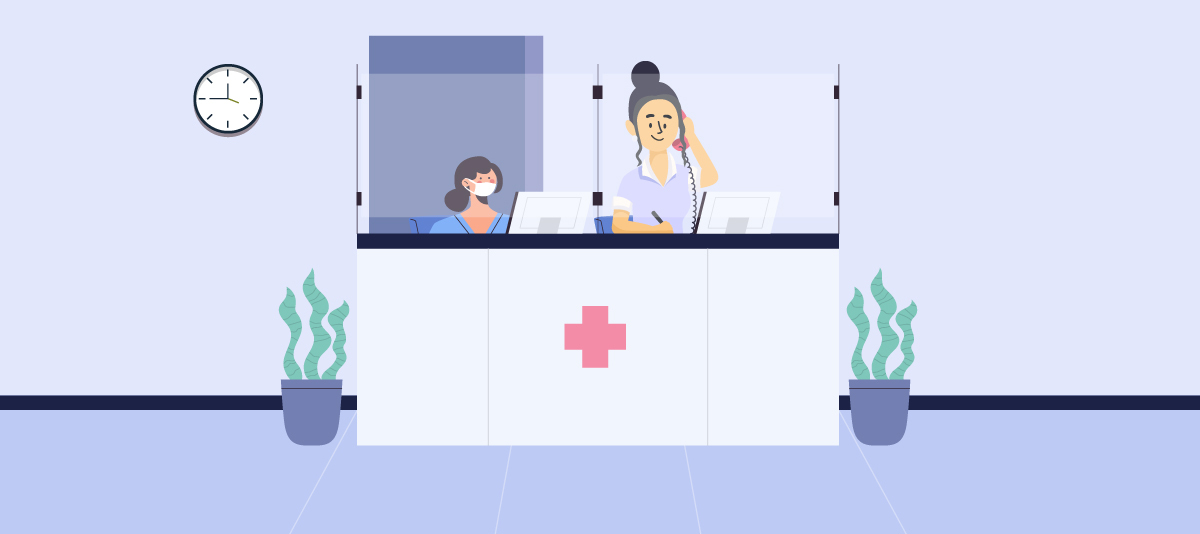 In healthcare organizations, when every second matters, patients use phone systems to coordinate with doctors and clinical service providers. As healthcare remains an industry that operates on the edge, a robust phone system is needed to manage communications with patients. On the other hand, in large hospitals, doctors and nurses must coordinate amongst themselves and between wards and departments to ensure that a patient gets the right treatment. Therefore, seamless collaboration and sound communication tools remain the lifeline of hospitals. An efficient hospital phone system helps hospitals enhance patient outcomes, deliver a positive patient experience, reduce patient waiting times, and increase the efficiency of the healthcare system. With technological advancements, VoIP phone systems are replacing traditional desk phone lines. They help reduce operating costs, improve the flow of work, enhance the efficiency of healthcare operations, and so on.
In healthcare organizations, when every second matters, patients use phone systems to coordinate with doctors and clinical service providers. As healthcare remains an industry that operates on the edge, a robust phone system is needed to manage communications with patients. On the other hand, in large hospitals, doctors and nurses must coordinate amongst themselves and between wards and departments to ensure that a patient gets the right treatment. Therefore, seamless collaboration and sound communication tools remain the lifeline of hospitals. An efficient hospital phone system helps hospitals enhance patient outcomes, deliver a positive patient experience, reduce patient waiting times, and increase the efficiency of the healthcare system. With technological advancements, VoIP phone systems are replacing traditional desk phone lines. They help reduce operating costs, improve the flow of work, enhance the efficiency of healthcare operations, and so on.
"While setting up the hospital phone system, the first step is to evaluate the requirements of your business and then choose one that aligns with your business needs. A lot of healthcare businesses were reluctant to invest in communication systems. But, the evolution of cloud phone systems reduces the need for upfront investments, and you pay only for what you use. "
Top 12 Hospital Phone Systems in 2023
There are several companies that offer VoIP for hospitals. We have curated the top 11 hospital phone systems to make it easy for you to choose one based on your requirements.
| Brand Name | Rating | Key Features | Pricing |
|---|---|---|---|
| CallHippo | Call forwarding Call recording Voicemail Text messaging | Basic: $0 Bronze: $16 per user/month Silver: $24 per user/month Platinum: $40 per user/month | |
| Five9 | Appointment Management AI-based, automated call routing Call Conferencing Automatic Call Distribution Intelligent virtual agent Workforce optimization | Core: $149 monthly Premium: $169 monthly Optimum: $199 monthly Ultimate: $229 monthly | |
| Nextiva | Auto attendant Hold music Mobile app and desktop app Video conferencing Audio-only conferencing Advanced IVR systems Caller ID | Essentials: $18.95 monthly Professional: $22.95 monthly Enterprise: $32.95 monthly | |
| RingCentral | Business phone or toll-free numbers Unlimited calling within the US and Canada Business SMS IVR | Core: $20 per user/month Advanced: $25 per user/month Ultra: $35 per user/month | |
| Dialpad | Text, audio, and video calling Speech analytics Caller ID Mobile app and desktop app IVR systems | Standard: $15 per user per month Pro: $25 per user per month Enterprise: Contact sales |
1. CallHippo
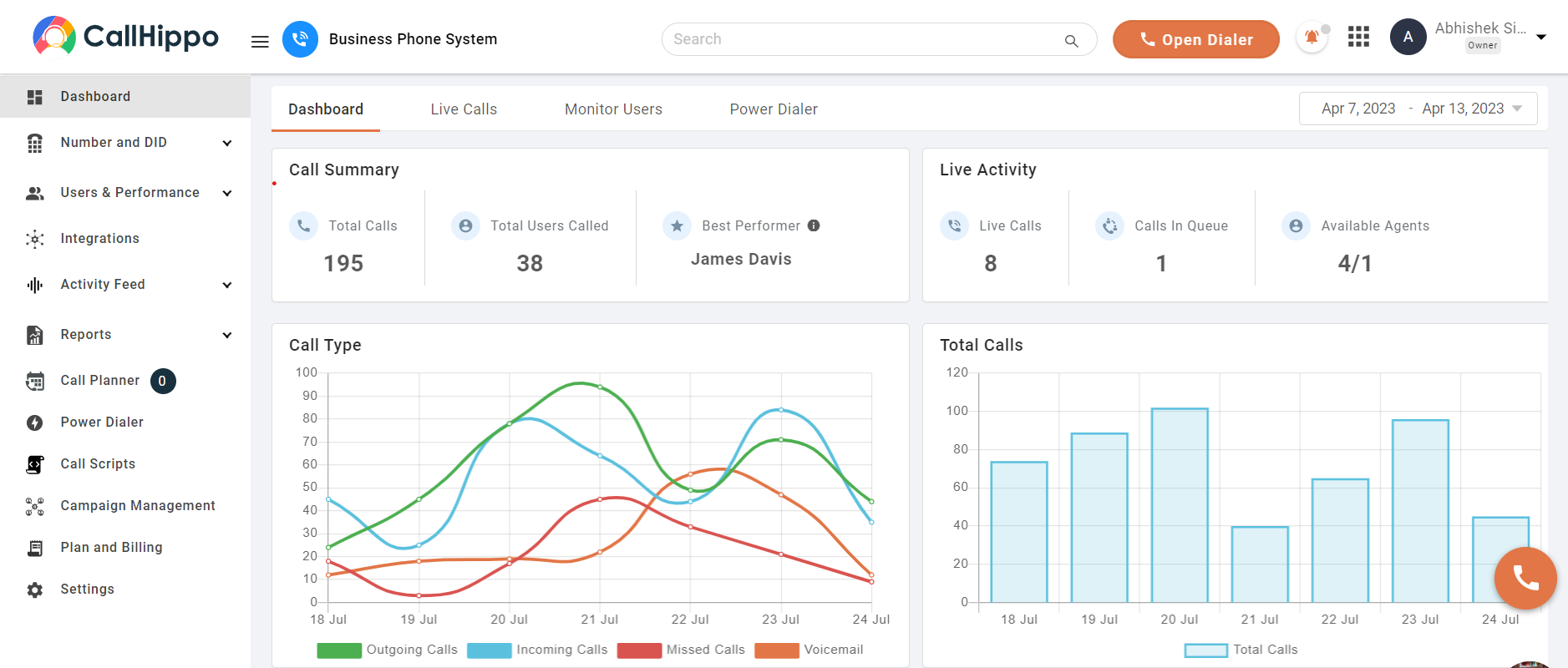 CallHippo is a cloud-based phone system and remains our top pick for the best phone system for healthcare businesses. It is a Voice Over Internet Protocol (VoIP) phone system, so you don’t have to install telephone lines or insert a SIM card to be able to communicate. Its features range from call recording, call conference, and call forwarding to power dialer and voice mail transcription. CallHippo phone systems are appropriate for healthcare businesses of different scales ranging from solopreneurs and startups to large corporate hospital chains that deal with high call volumes. The configuration is very simple, and CallHippo assures a three-minute launch.
CallHippo is a cloud-based phone system and remains our top pick for the best phone system for healthcare businesses. It is a Voice Over Internet Protocol (VoIP) phone system, so you don’t have to install telephone lines or insert a SIM card to be able to communicate. Its features range from call recording, call conference, and call forwarding to power dialer and voice mail transcription. CallHippo phone systems are appropriate for healthcare businesses of different scales ranging from solopreneurs and startups to large corporate hospital chains that deal with high call volumes. The configuration is very simple, and CallHippo assures a three-minute launch.
Key features
- Auto attendant
- On hold music
- Automatic call distribution
- Voicemail greeting
- Shared inbox
- Call transfer
- Call recording
- Call queuing
- Smart call forwarding
Pros
- CallHippo has a user-friendly interface. It offers quick access to call status history along with critical insights and data.
- CallHippo offers a 10-day free trial in all its premium plans. The basic plan is free and ideal for startups that require limited features.
- The pricing is affordable, and it is transparent with no hidden costs.
- CallHippo has extensive call management features, from intelligent call routing to call queuing and automatic call distribution.
- CallHippo is compliant with HIPAA (Health Insurance Portability and Accountability Act) and GDPR regulations.
Cons
- Voicemail technology used in CallHippo is basic and needs upgradation.
- Call clarity is lost when the internet connection is spotty.
Pricing
- Basic plan: Free forever
- Bronze Plan: $16 per user per month
- Silver Plan: $24 per user per month
- Platinum Plan: $40 per user per month
- Enterprise Plan: $48 per user per month
2. Five9
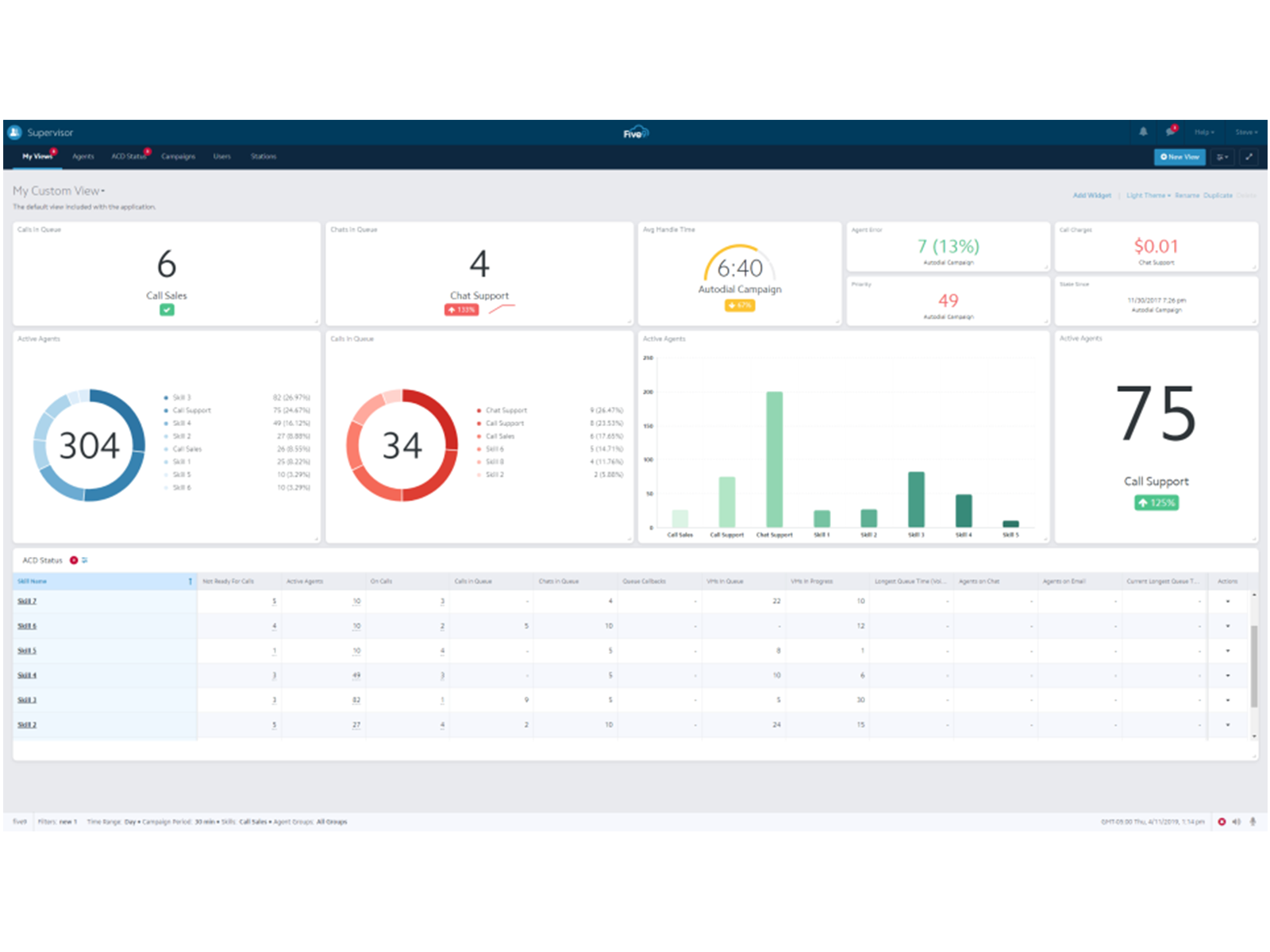 Five9 is an AI-powered healthcare contact center solution that helps manage inbound and outbound calls in one go. It is a cloud-based phone system with intelligent routing features that maps the call to the appropriate agent. Five9 phone systems have intelligent virtual agents that answer common customer questions and problems automatically. This reduces agent burnout and helps enhance the overall efficiency of the healthcare chain.
Five9 is an AI-powered healthcare contact center solution that helps manage inbound and outbound calls in one go. It is a cloud-based phone system with intelligent routing features that maps the call to the appropriate agent. Five9 phone systems have intelligent virtual agents that answer common customer questions and problems automatically. This reduces agent burnout and helps enhance the overall efficiency of the healthcare chain.
Key Features
- Appointment Management
- AI-based, automated call routing
- Call Conferencing
- Automatic Call Distribution
- Intelligent virtual agent
- Workforce optimization
- EHR (Electronic Health Records) integration
Pros
- Five9 has an intelligent virtual agent that automates repetitive tasks using AI tools so the agents can focus on core operations.
- Five9 healthcare contact center solution complies with the norms of HIPAA (The Health Insurance Portability and Accountability Act) and ensures patient data confidentiality
- Five9 business phone services can be integrated with other systems you use to manage Electronic Health Records, vendors, pharmacies, revenue cycles, etc.
- It generates analytics and insights that can be used to schedule and plan the workforce. This helps maintain the quality of patient service.
Cons
- Some users find it difficult to navigate the interface and layout.
- There are technical glitches, and call clarity is lost when the internet connection is spotty.
Pricing
- Core: $149 monthly
- Premium: $169 monthly
- Optimum: $199 monthly
- Ultimate: $229 monthly
You May Also Read : 14 Best Business VoIP Service Providers
3. RingCentral
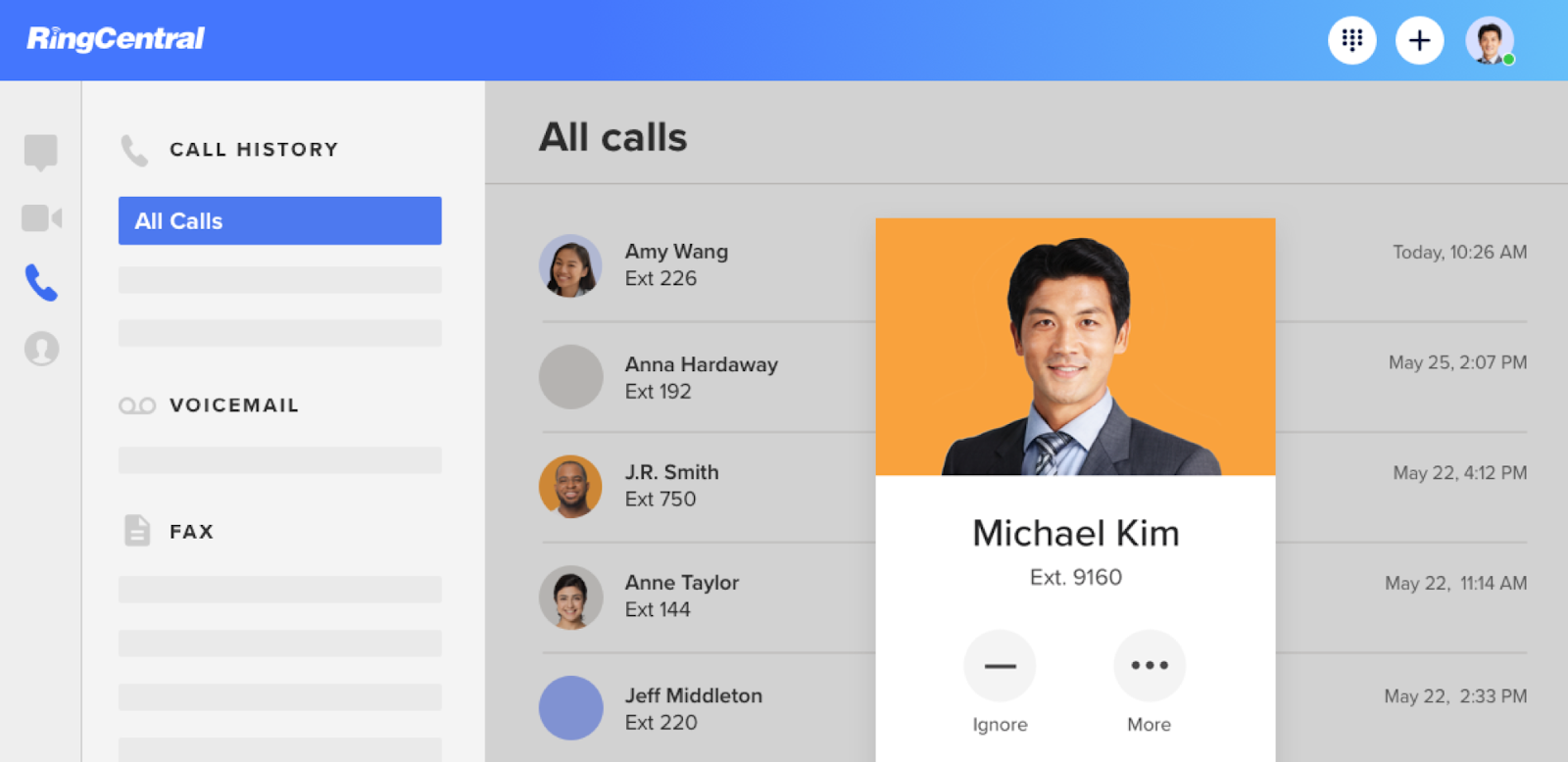 RingCentral is a popular cloud-based phone system with extensive features that streamline different modes of communication, including voice, text, and video. It has a mobile app and a web app allowing seamless delivery of telehealth services. The system also sends out SMS notifications for appointment and medication reminders. The chatbots help the patients understand the kind of medical assistance they require based on the common symptoms.
RingCentral is a popular cloud-based phone system with extensive features that streamline different modes of communication, including voice, text, and video. It has a mobile app and a web app allowing seamless delivery of telehealth services. The system also sends out SMS notifications for appointment and medication reminders. The chatbots help the patients understand the kind of medical assistance they require based on the common symptoms.
Key Features
- Appointment and medication reminders
- Patient self-service options
- Video and voice call
- Telehealth services
- Intelligent routing
- Unified communication abilities
Pros
- The RingCentral hospital phone system has a patient portal that helps schedule and manage appointments.
- The team messaging tool promotes better coordination and communication between the patient access center and the clinical team.
- RingCentral prioritizes patient privacy and complies with HIPAA (The Health Insurance Portability and Accountability Act).
Cons
- RingCentral lacks a custom greeting feature.
- RingCentral business phone services are difficult to scale.
Pricing
- Essentials plan: $19.99 per user per month
- Standard plan: $27.99 per user per month
- Premium plan: $34.99 per user per month
- Ultimate plan: $49.99 per user per month
4. Nextiva
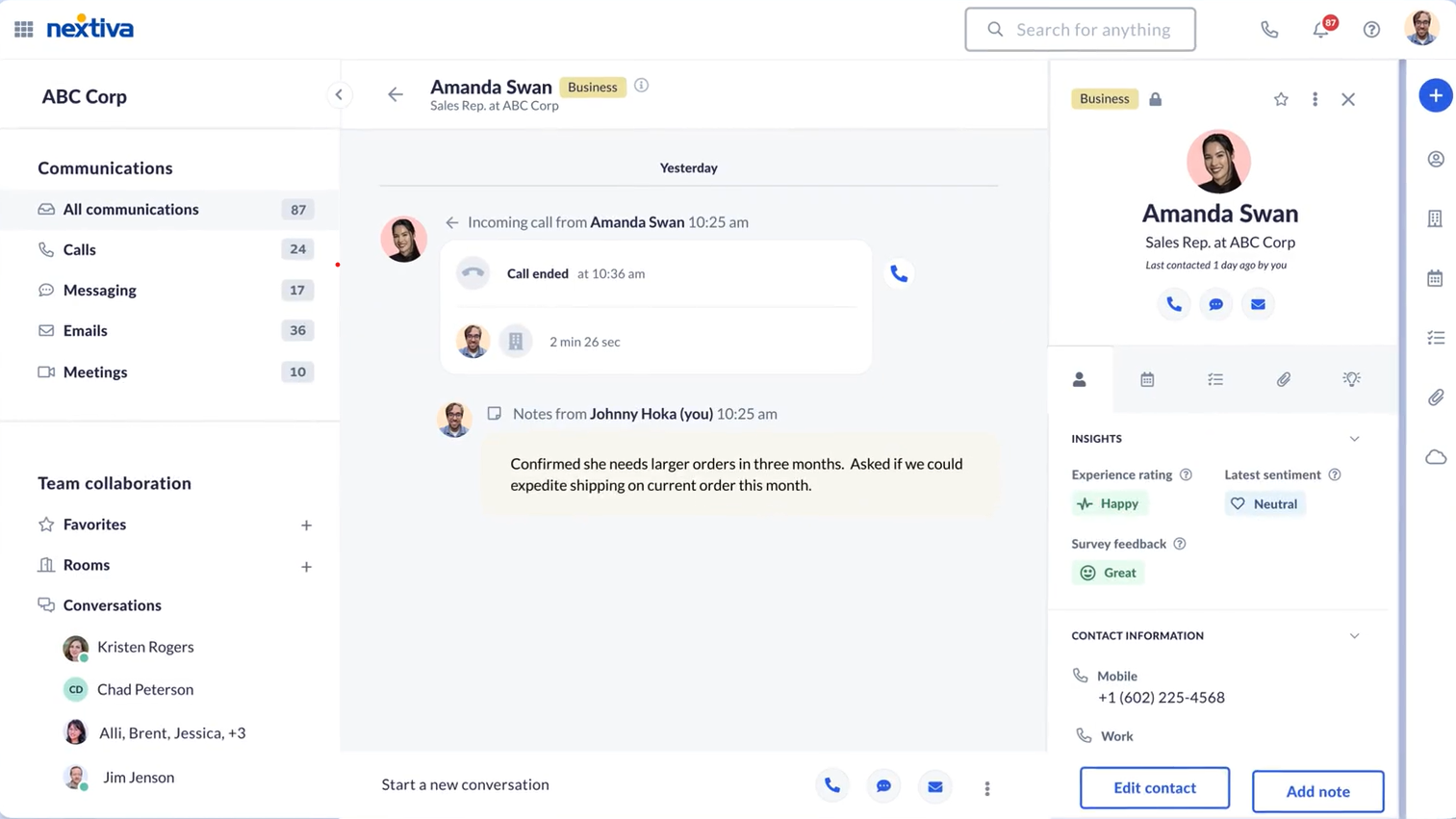 Nextiva provides a unified cloud communication system for businesses in the healthcare industry. It has integrated tools for video, voice, and text messaging. It has a mobile app and so doctors and clinical teams can make and receive calls from where they are. The Nextiva mobile app can be installed on both iOS and Android platforms. It has extensive call management features, including IVR systems, call forwarding, auto attendant, faxing, conference calling, automatic call distribution, etc. With more than seven data centers, Nextiva guarantees 99.999% uptime.
Nextiva provides a unified cloud communication system for businesses in the healthcare industry. It has integrated tools for video, voice, and text messaging. It has a mobile app and so doctors and clinical teams can make and receive calls from where they are. The Nextiva mobile app can be installed on both iOS and Android platforms. It has extensive call management features, including IVR systems, call forwarding, auto attendant, faxing, conference calling, automatic call distribution, etc. With more than seven data centers, Nextiva guarantees 99.999% uptime.
Key Features
- Auto attendant
- Hold music
- Mobile app and desktop app
- Video conferencing
- Audio-only conferencing
- Advanced IVR systems
- Caller ID
Pros
- Nextiva has a mobile app so the team can access the business phone service from anywhere.
- Nextiva is HIPAA (The Health Insurance Portability and Accountability Act) compliant and so ensures the protection of patient data shared with healthcare providers.
- Nextiva offers extensive 24*7 customer service and support with all its plans.
- With Nextiva, you can pick features from different plans and build customized plans to match your requirements.
Cons
- Nextiva follows a strict cancellation policy.
- Its pricing plans are not affordable for small businesses with less than five accounts.
Pricing
- Essentials: $18.95 per user per month
- Professional: $22.95 per user per month
- Enterprise: $32.95 per user per month
5. Dialpad
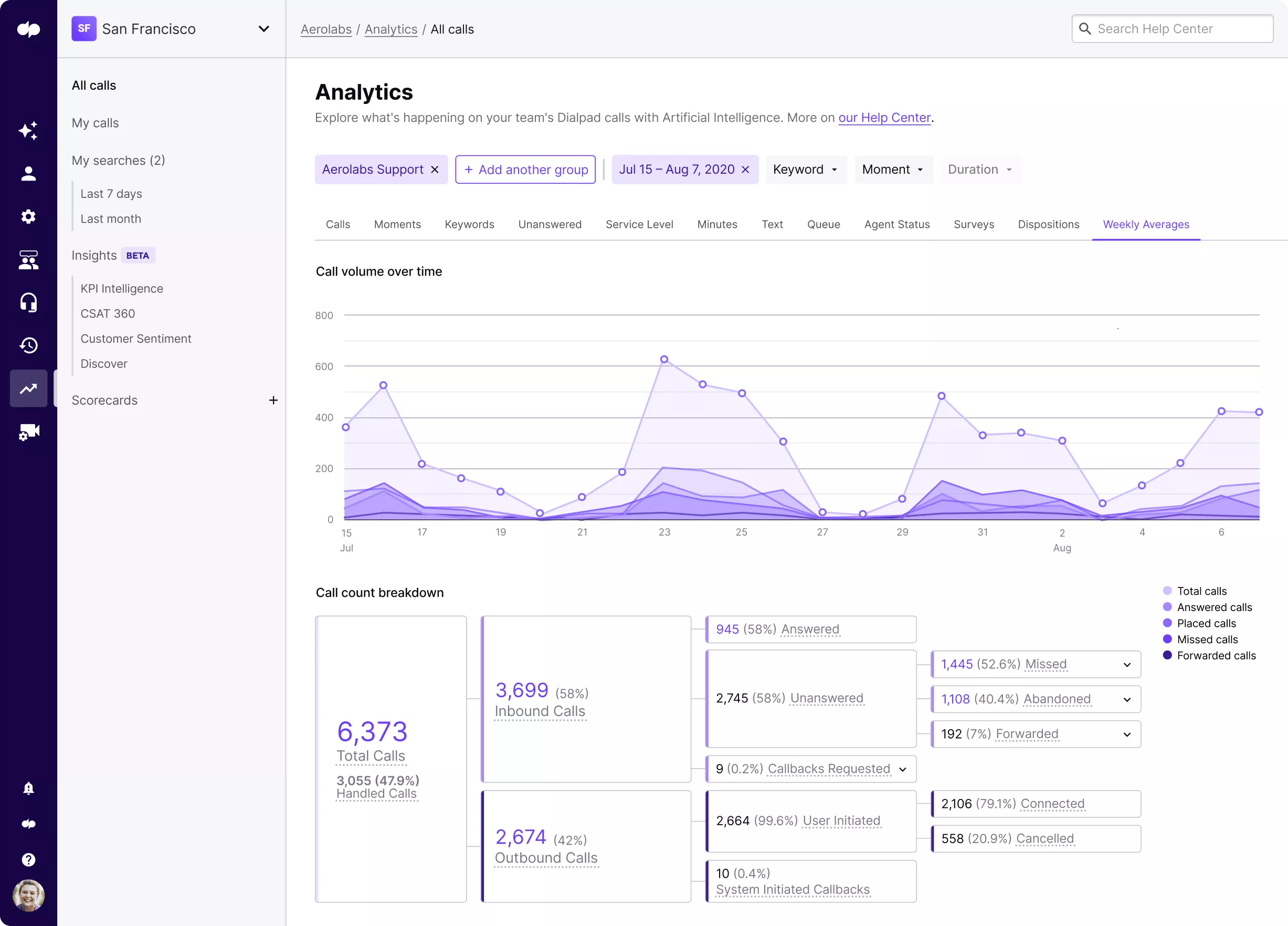 Dialpad is an AI-powered cloud communication system that lets businesses collaborate with colleagues and customers in one go. It offers a desktop and mobile app and can be accessed through a browser. Dialpad enables virtual consultation through smartphones and laptops. Its advanced call management features, like call routing, help reduce waiting times and accelerate patient onboarding and enrollment. Dialpad has a voice intelligence feature that takes call summaries so you can access the conversation later. It also has ring groups that help you direct the call to the whole team so the available agents can pick up and answer the call.
Dialpad is an AI-powered cloud communication system that lets businesses collaborate with colleagues and customers in one go. It offers a desktop and mobile app and can be accessed through a browser. Dialpad enables virtual consultation through smartphones and laptops. Its advanced call management features, like call routing, help reduce waiting times and accelerate patient onboarding and enrollment. Dialpad has a voice intelligence feature that takes call summaries so you can access the conversation later. It also has ring groups that help you direct the call to the whole team so the available agents can pick up and answer the call.
Key Features
- Text, audio, and video calling
- Speech analytics
- Caller ID
- Mobile app and desktop app
- IVR systems
- Virtual appointments and consultation
- Virtual waiting rooms
Pros
- Dialpad healthcare phone system lets you collaborate with patients and internal teams in one go.
- Dialpad offers AI-based voice intelligence and analytics in all its plans.
- It comes with a mobile app so the team can collaborate and communicate from where they are.
- Dialpad offers virtual waiting rooms for both in-person appointments and virtual consultations.
- Dialpad complies with HIPAA and GDPR regulations ensuring the protection and privacy of patient records.
Cons
- Dialpad does not offer 24/7 customer support in the basic plan.
- Dialpad phone systems offer limited integration support, and it is difficult to scale.
Pricing
- Standard: $15 per user per month
- Pro: $25 per user per month
- Enterprise: Contact sales for a custom quote
6. DialerHQ
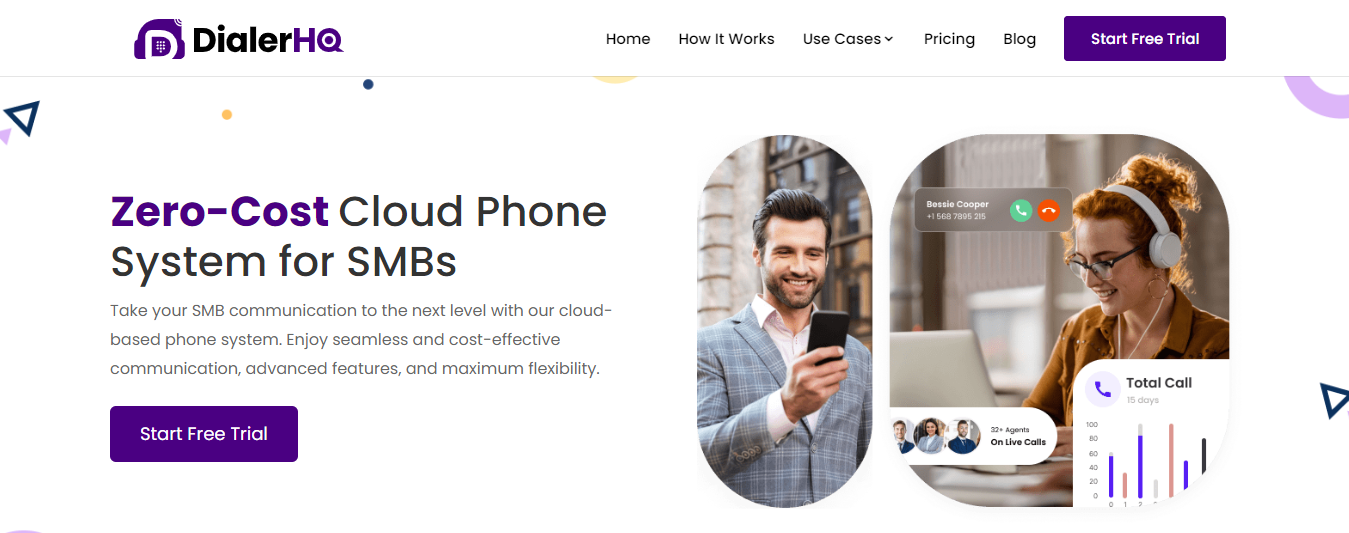 DialerHQ offers advanced communication solutions tailored to hospitals and healthcare facilities’ unique needs. Their feature-rich phone systems are designed to streamline hospital operations with call routing, tracking, texting, analytics, recording, and more to improve staff collaboration and patient care. DialerHQ provides the communication technology hospitals require for efficient, patient-focused care.
DialerHQ offers advanced communication solutions tailored to hospitals and healthcare facilities’ unique needs. Their feature-rich phone systems are designed to streamline hospital operations with call routing, tracking, texting, analytics, recording, and more to improve staff collaboration and patient care. DialerHQ provides the communication technology hospitals require for efficient, patient-focused care.
Key Features
- Intelligent reports/analytics
- Reports via email
- Call barging
- Call queuing
- Sms/text messages
Pros
- Downloading and managing DialerHQ is extremely easy for users.
- Customer support is available 24/7 on DialerHQ, assisting round-the-clock.
- DialerHQ offers advanced call management features to ensure efficient call handling.
- Prioritizing affordability and convenience, DialerHQ enables individuals to experience its services through a 10-day free trial before committing.
Cons
- DialerHQ may not be suitable for larger corporations or enterprises.
- Call quality problems, including dropped calls and call lags, have been encountered by users.
- DialerHQ offers few safety features, potentially raising some safety concerns.
Pricing
- Basic – $0 per user/ month
- Bronze – $7.99 per user/ month
- Silver plan- $11.99 per user/ month
- Platinum plan – $19.99 per user/ month
7. Vonage
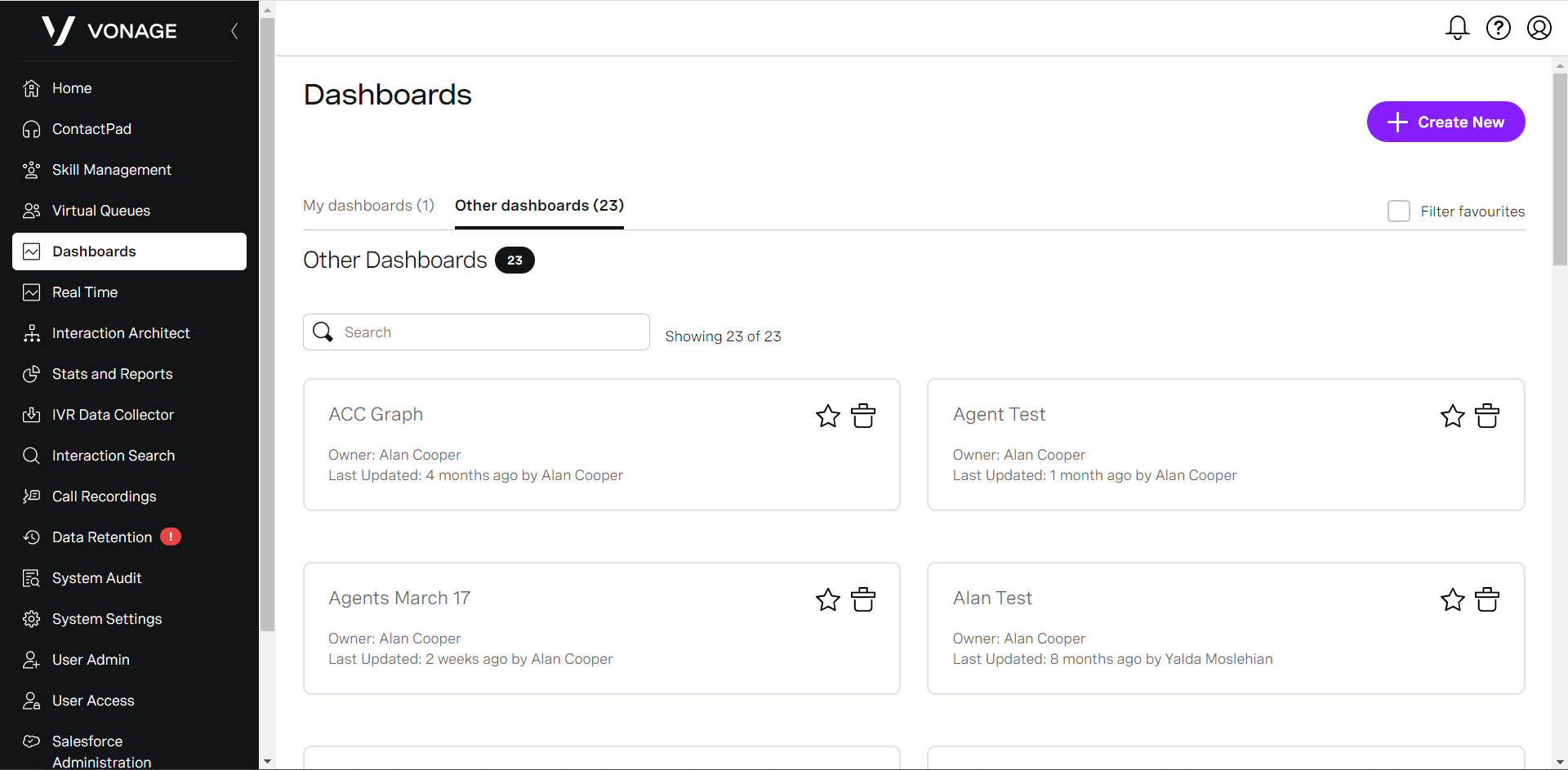 Vonage phone communication system aims to promote a patient-centric, healthcare cloud contact center, and efficient telehealth services. They offer omnichannel communication support where patients can communicate with the medical team through voice, SMS, video, Whatsapp, social media platforms, etc. Vonage lets you add additional phones without any extra cost. It provides a mobile phone and desktop app so the team can make or receive calls from anywhere, anytime.
Vonage phone communication system aims to promote a patient-centric, healthcare cloud contact center, and efficient telehealth services. They offer omnichannel communication support where patients can communicate with the medical team through voice, SMS, video, Whatsapp, social media platforms, etc. Vonage lets you add additional phones without any extra cost. It provides a mobile phone and desktop app so the team can make or receive calls from anywhere, anytime.
Key Features
- Video conferencing
- On-demand patient appointment scheduling
- Appointment reminders
- Smart call routing
- Omnichannel communication support
- Custom auto attendants
Pros
- The configuration is simple, and adding users to the platform is easy.
- Appointment reminders help reduce the cost of patient no-shows.
- Efficient collaboration through SMS, voice, video, and Whatsapp platforms.
- Vonage systems comply with The Health Insurance Portability and Accountability Act (HIPAA) and The Health Information. Technology for Economic and Clinical Health (HITECH) Act, so you don’t have to worry about legal implications or the security of your patient data.
Cons
- Users report poor call clarity at times.
- Vonage customer service is not up to the mark.
- Vonage customer service is not up to the mark.
Pricing
- Mobile: $19.99 per line per month
- Premium: $29.99 per line per month
- Advanced: $39.99 per line per month
You May Also Read : What is Hosted VoIP? Benefits, Features, and Importance
8. 8X8
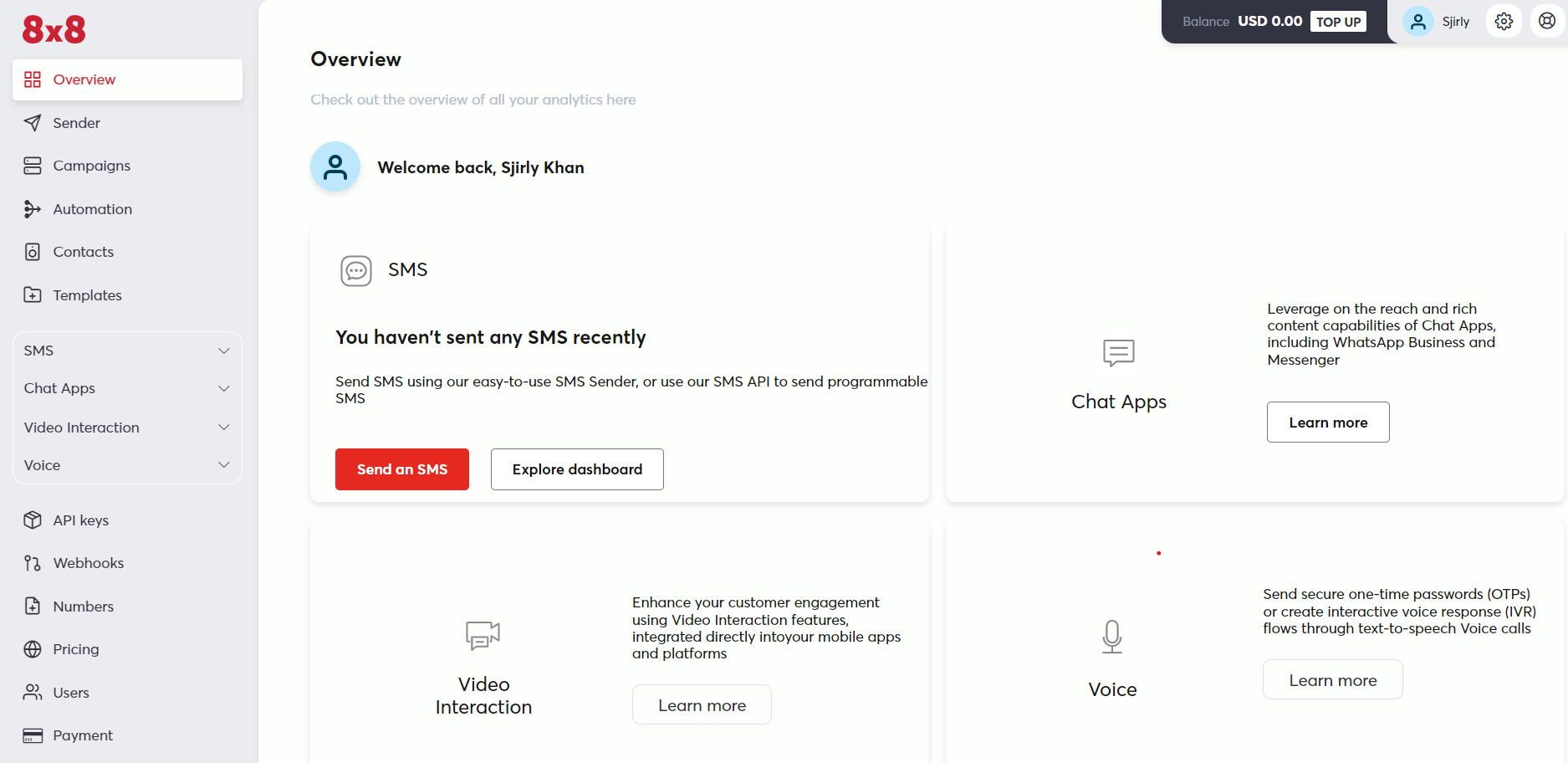 8×8 phone systems help healthcare organizations enhance the quality of patient service by offering omnichannel communication support. It provides voice, SMS, video, and chat abilities so patients can engage with healthcare providers efficiently. It lets doctors set the status of their availability and so avoid interruptions while dealing with patients or during surgery. The patient’s medical history is stored in the cloud system, and the staff can access it whenever necessary. This ensures effective patient service.
8×8 phone systems help healthcare organizations enhance the quality of patient service by offering omnichannel communication support. It provides voice, SMS, video, and chat abilities so patients can engage with healthcare providers efficiently. It lets doctors set the status of their availability and so avoid interruptions while dealing with patients or during surgery. The patient’s medical history is stored in the cloud system, and the staff can access it whenever necessary. This ensures effective patient service.
Key Features
- 3-way calling
- Role-based access and controls
- Custom auto attendants
- Call recordings
- Real-time call analytics
- HIPAA compliant
- Call queuing
- Mobile and desktop app
Pros
- 8×8 phone systems enhance the quality of patient care using advanced features like speech analytics, AI-based self-service options, etc.
- Using 8×8 VoIP phone systems, the medical team and nurses can interact with the patients through chat, voice calls, and video conferencing.
- 8×8 phone systems are compatible with electronic patient systems, which helps resolve patient inquiries faster.
- With real-time analytics, the phone system increases the productivity of healthcare staff. It also aids in workforce optimization and staffing.
Cons
- 8×8 users endure difficulties in canceling their subscriptions.
- The app has technical glitches, so voice clarity is often lost.
Pricing
- Express – $15 per user per month
- X2 – $24 per user per month
- X4 – $44 per user per month
9. GoTo Connect
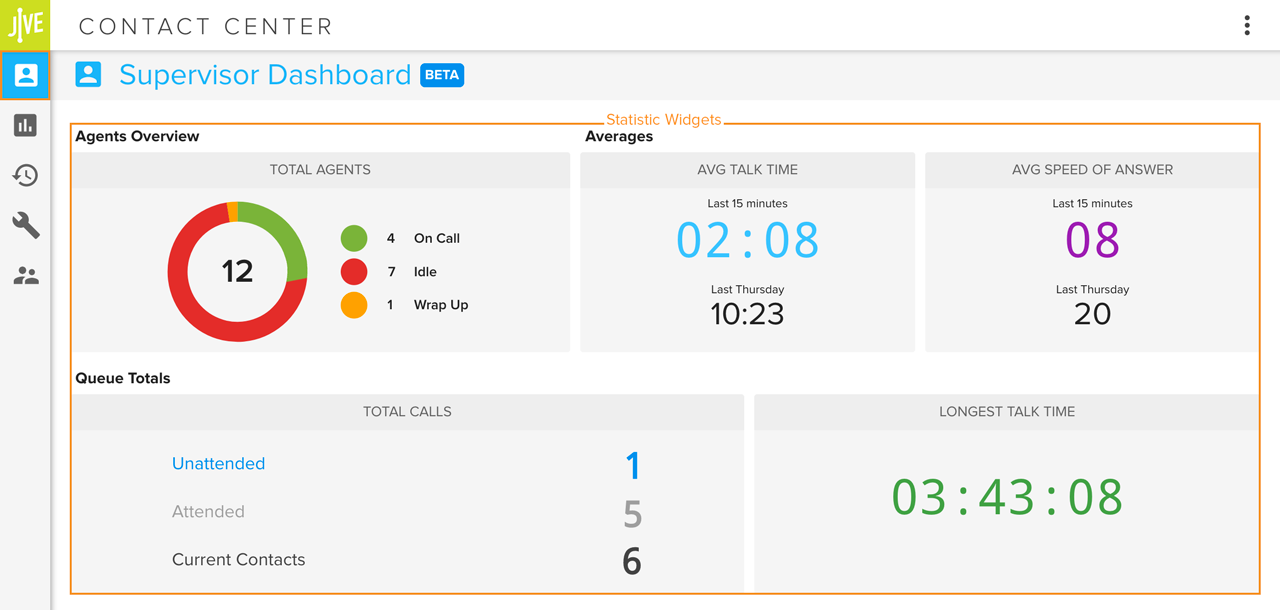 GoTo is a popular VoIP platform used to streamline healthcare communications. It has video, voice, and messaging abilities so patients can interact with doctors and the clinical team in multiple ways. It integrates with MS Teams, Slack, Google, Outlook, and other calendar plugins and can simplify healthcare communications. It lets users create private groups so doctors and the clinical team can effortlessly share intricate details about a patient. Through the pre-configured GoTo meeting platform, healthcare providers can schedule patient appointments.
GoTo is a popular VoIP platform used to streamline healthcare communications. It has video, voice, and messaging abilities so patients can interact with doctors and the clinical team in multiple ways. It integrates with MS Teams, Slack, Google, Outlook, and other calendar plugins and can simplify healthcare communications. It lets users create private groups so doctors and the clinical team can effortlessly share intricate details about a patient. Through the pre-configured GoTo meeting platform, healthcare providers can schedule patient appointments.
Key Features
- Voice, video, and messaging abilities
- Call flow customization
- Call forwarding
- Call routing
- Call volume analytics
- Workforce optimization
- Customized hold music
- Access controls and permissions
Pros
- GoTo phone systems have a dial plan editor and IVR routing strategies, enabling call filtering and advanced call routing.
- GoTo offers unlimited auto attendants and submenus. It also allows users to record their custom greetings.
- GoTo phone system is HIPAA compliant so that healthcare providers can ensure the safety of patient data.
- GoTo meetings offer real-time analytics and historical data in a customizable template. This enables data-driven decision-making and planning.
Cons
- Advanced features like call analytics and monitoring are available only in advanced plans.
- Offers limited third-party integrations when compared to available VoIP for healthcare.
Pricing
- Basic: $27 per user per month
- Standard: $32 per user per month
10. Ooma
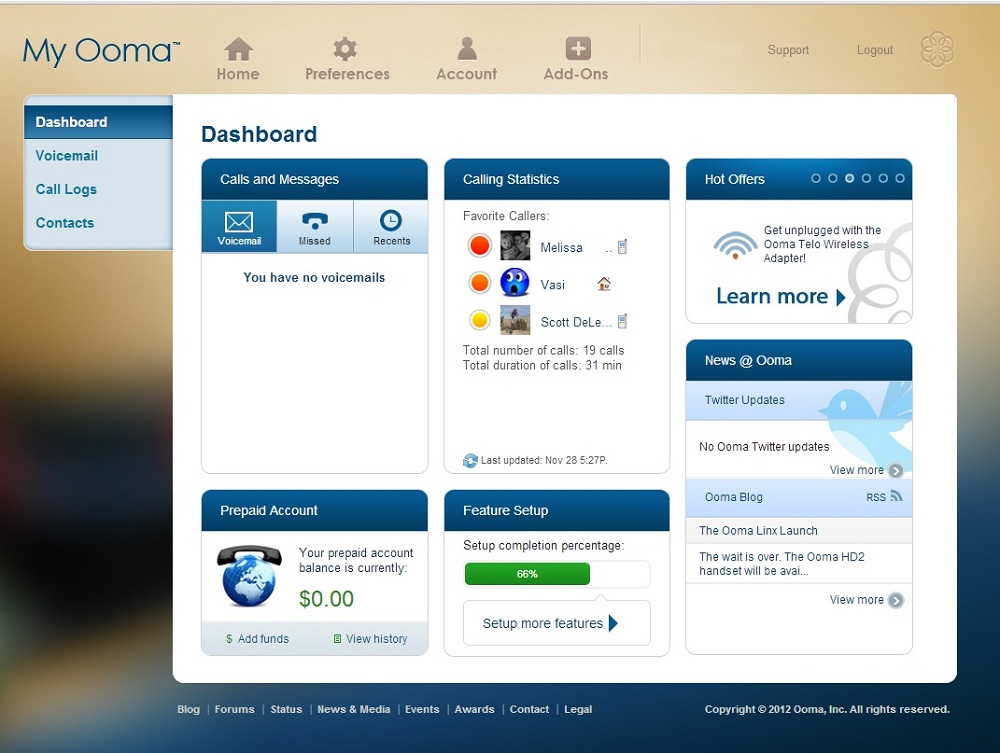 Ooma is a cloud-based communication platform that helps healthcare organizations deliver a positive patient experience. Using the Ooma app, you can create a custom greeting message, configure business hours, and set up ring groups. Ooma phone system has 50+ features including on-hold greetings, caller ID, call recording, auto attendants and so on. It can be integrated to the other platforms deployed in the hospital for appointment calendars, billing, etc.
Ooma is a cloud-based communication platform that helps healthcare organizations deliver a positive patient experience. Using the Ooma app, you can create a custom greeting message, configure business hours, and set up ring groups. Ooma phone system has 50+ features including on-hold greetings, caller ID, call recording, auto attendants and so on. It can be integrated to the other platforms deployed in the hospital for appointment calendars, billing, etc.
Key Features
- Ring groups
- Auto attendant
- Time-based, Intelligent call routing
- Call logs
- Caller ID
- Call recording
- Business phone number
- Music on hold
- Dial by extension
Pros
- Ooma pricing plans are transparent and involve no hidden charges.
- The call recording feature helps save important conversations in the Electronic Health Record (EHR) system for future reference.
- Ooma phone system can be integrated with appointment calendars and billing systems, ensuring an efficient workflow.
- Ooma has a mobile app so the medical staff can handle phone calls from anywhere.
- Ooma phone systems let users create customized ring groups that ring multiple team members when there is an incoming call. This helps ensure that incoming calls are properly routed and answered properly.
Cons
- Ooma does not offer a free trial in any of its subscription plans.
- Ooma systems do not have abilities to identify spam calls and block them accordingly.
Pricing
- Essentials: $19.95 per user per month
- Pro: $24.95 per user per month
- Pro Plus: $29.95 per user per month
11. Mitel
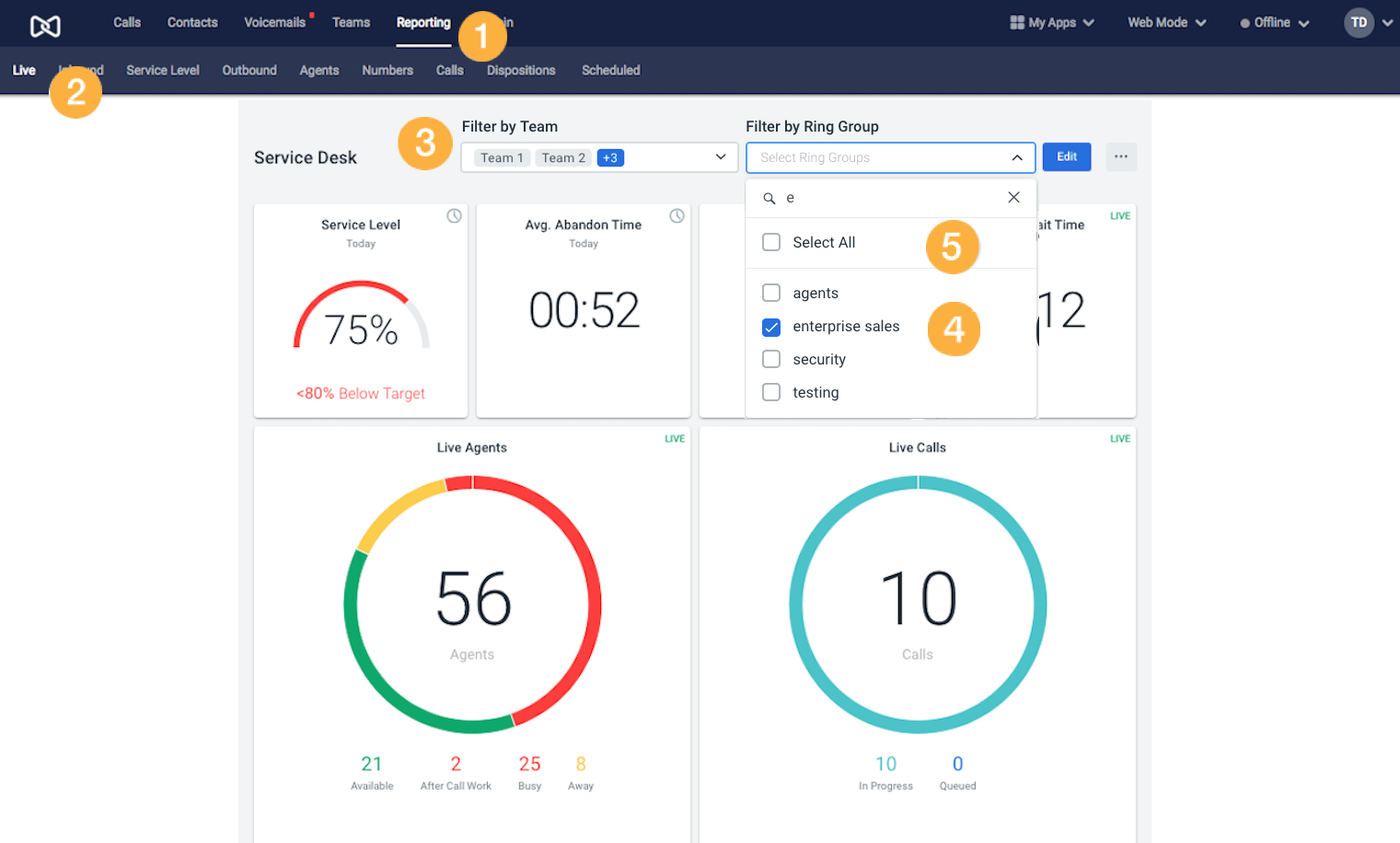 Mitel is a popular healthcare phone system that offers on-premise and cloud-based communication systems to manage medical business chains. It has a suite of tools that allow the clinical team to communicate through instant messaging, audio calls, video conferencing, etc. This helps engage with patients through a medium of convenience and preference. It helps deliver real-time notifications to patients about their appointment schedules and medications and keep track of their recovery.
Mitel is a popular healthcare phone system that offers on-premise and cloud-based communication systems to manage medical business chains. It has a suite of tools that allow the clinical team to communicate through instant messaging, audio calls, video conferencing, etc. This helps engage with patients through a medium of convenience and preference. It helps deliver real-time notifications to patients about their appointment schedules and medications and keep track of their recovery.
Key Features
- File sharing
- Audio and video conferencing
- Call forwarding
- Predefined call routing
- Team chat
- Call logs and history
- Personal dashboard
- Voicemail technology
Pros
- Businesses have a choice of opting for on-premise and cloud-based solutions.
- The on-premise and cloud-based phone systems offered by Mitel are HIPAA compliant.
- The Mitel phone system can be integrated with the existing Hospital Information Technology (HIT) systems to improve overall efficiency.
- It provides IVR systems and calls routing abilities that help direct incoming calls to the right agent.
- Its call prioritization feature prioritizes patient calls automatically.
Cons
- Customer service quality is not so good and needs improvements.
- Calls get dropped frequently.
- Mitel does not have pricing plans listed on the website.
Pricing
- Contact sales for customized quotations.
12. OpenPhone
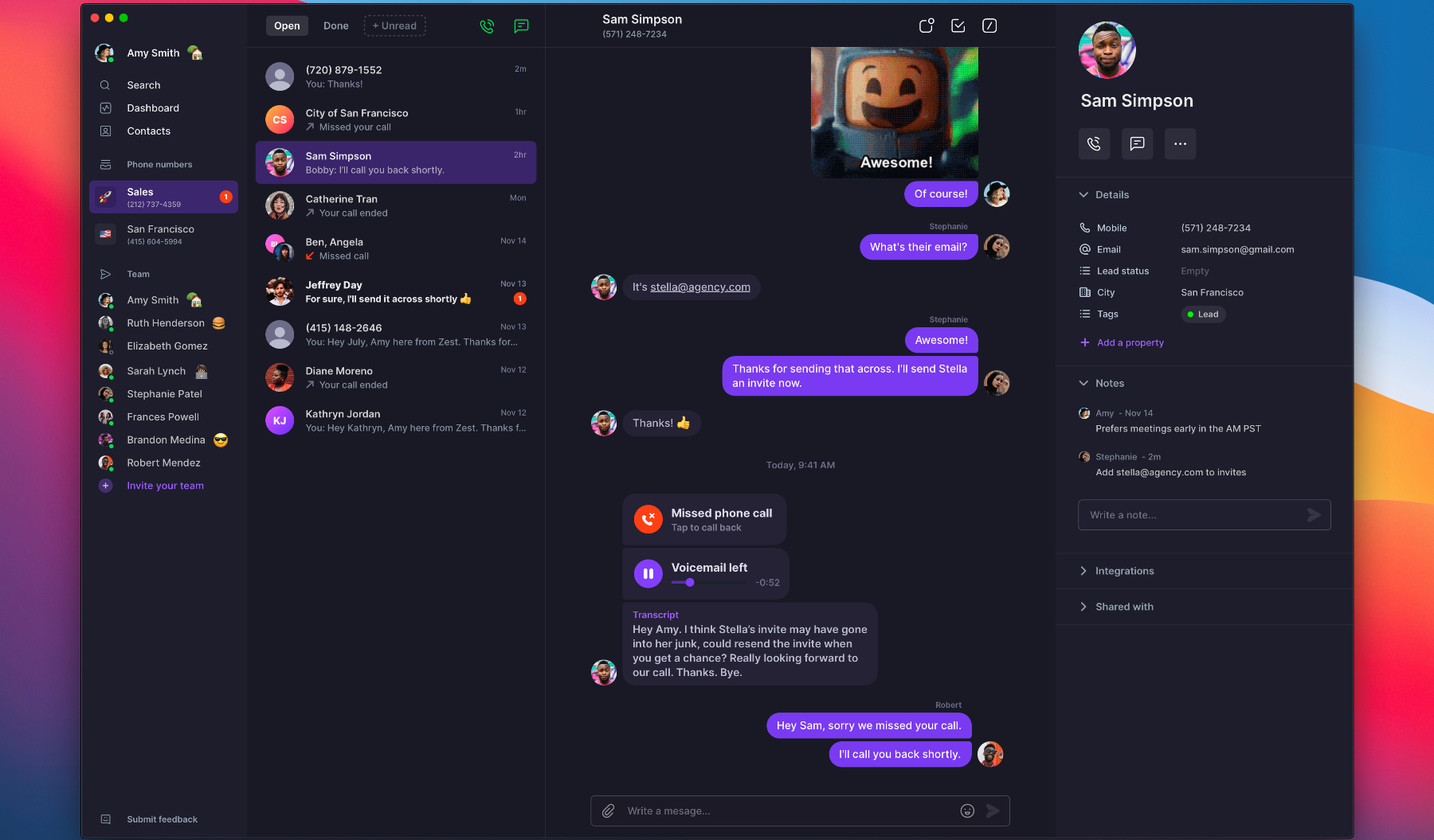 OpenPhone is a cloud-based hospital phone system that helps manage calls, messages, and contacts in one place. The unified platform helps manage external and internal communications. It supports integration with other CRM and team collaboration tools like Slack, Zapier, and HubSpot. It has advanced call management features like intelligent call routing and auto attendants that help route incoming calls to the appropriate agent. It has shared inboxes, and users can tag others in the clinical team to seek immediate attention.
OpenPhone is a cloud-based hospital phone system that helps manage calls, messages, and contacts in one place. The unified platform helps manage external and internal communications. It supports integration with other CRM and team collaboration tools like Slack, Zapier, and HubSpot. It has advanced call management features like intelligent call routing and auto attendants that help route incoming calls to the appropriate agent. It has shared inboxes, and users can tag others in the clinical team to seek immediate attention.
Key Features
- Contact management
- Shared inbox
- Send quick reactions to messages
- Set business hours
- Smart call routing
- Spam call muting
- Call recording
Pros
- OpenPhone has an Android and iOS mobile app, so healthcare providers can take up patient calls from anywhere.
- It delivers call analytics and reports that offer insights into call volumes, duration, etc. and helps optimize agent performance.
- Openphone offers excellent customer support via chat, phone, and email.
- Using OpenPhone, you can set business hours and mute calls from specific numbers.
- OpenPhone pricing plans are affordable and appropriate for small clinics, healthcare organizations, and startups.
Cons
- The standard plan does not have call transfer functionality.
- OpenPhone extends limited integration support with native apps.
Pricing
- Standard: $13 per user per month
- Premium: $20 per user per month
- Enterprise: Contact OpenPhone technologies
Features of Hospital Phone Systems
The ultimate purpose of hospital phone systems is to promote seamless communication between healthcare providers and patients as well as internal collaboration. Following are some of the key features that you must consider while deploying a phone system for your healthcare service business. 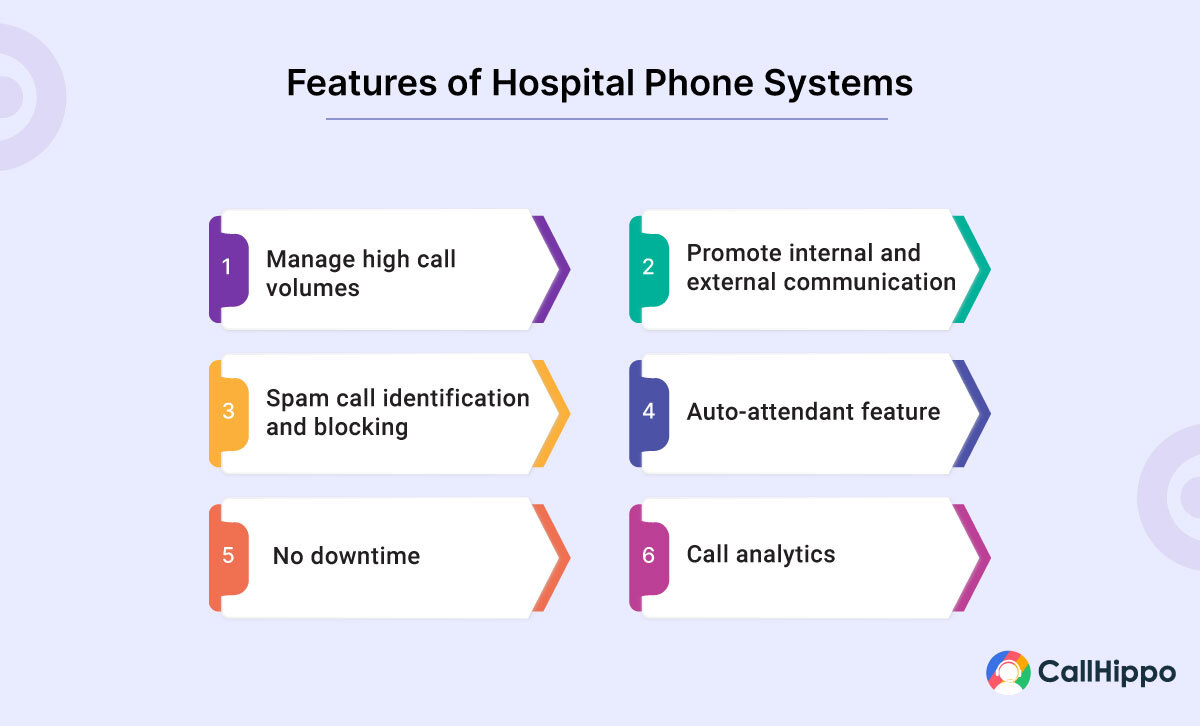
1. Manage high call volumes
Hospital phone lines are flooded with patient calls, and the phone system must be able to accommodate such high call volumes. It should ensure that all calls are being attended to and no calls go missed.
2. Promote internal and external communication
Internally, nurses and doctors communicate with each other and with other departments. Beyond appointment scheduling, doctors also communicate with patients over voice calls and video calls to ensure that the patients get timely advice and consultation. An efficient hospital system must promote seamless collaboration between all the parties involved.
3. Spam call identification and blocking
Spam calls are annoying, particularly at hospitals where there are high call volumes. The hospital phone system must ensure that spam calls are properly identified and automatically blocked.
4. Auto-attendant feature
As hospitals endure high call volumes, having an auto-attendant will help route the call automatically to the appropriate agent or department. This will reduce burnout and enhance the efficiency of the overall functioning.
5. No downtime
The phone system must be integrated and deployed quickly, as hospital downtimes may cost human lives. It should be easy to configure and use and must not demand special training.
6. Call analytics
The hospital phone system must have the ability to generate call analytics and reports with details about the number of calls and time taken for each call. It will help the management in resource planning and evaluating the agent’s performance. Such reports help the management put forth data-driven decisions and drive potential impact.
How to Choose the Right Hospital Phone System?
As elaborated in the previous section, there are a lot of VoIP phone system providers for healthcare organizations. The following are the essential features you should consider before choosing a good phone system for healthcare organizations. 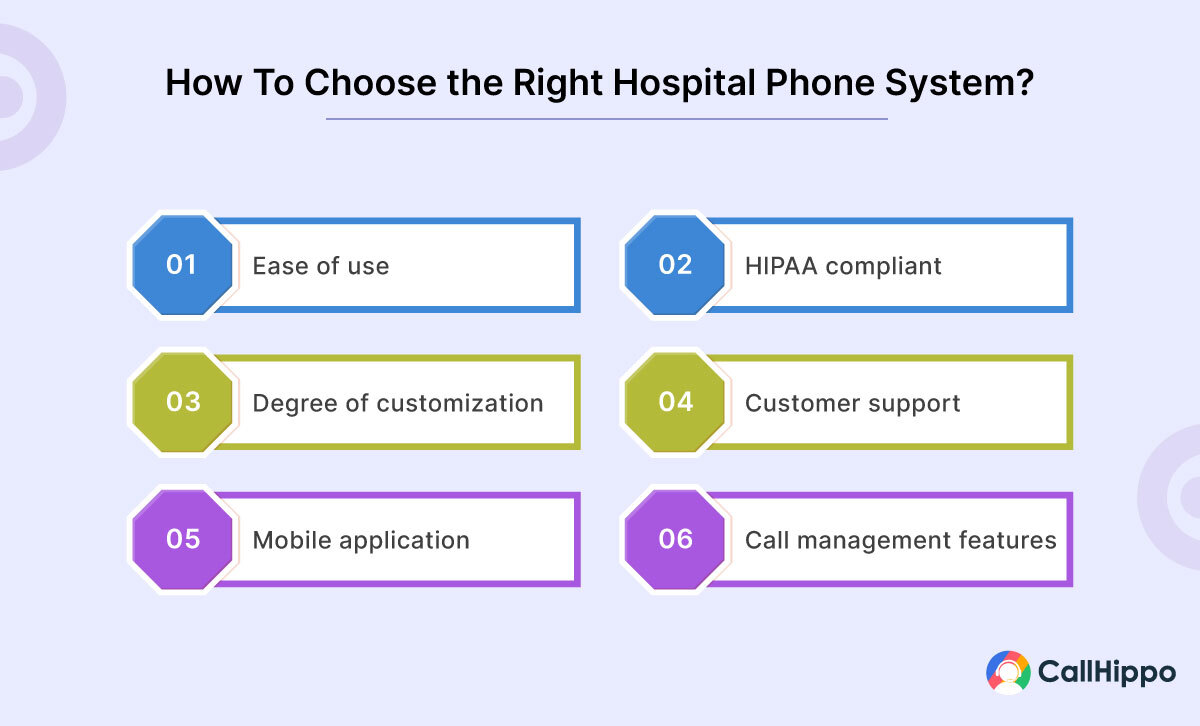
1. Ease of use
The phone system should be easy to configure and use without requiring technical experience and expertise. The signup, registration, and addition of new users to the team should not take long.
2. HIPAA compliant
Complying with HIPAA regulations is a must when it comes to healthcare businesses. While choosing a phone system for your healthcare business, ensure that you choose one that complies with HIPAA and other regulations.
3. Degree of customization
While choosing a hospital phone system, ensure that the features can be customized and scaled as per the needs of the business.
4. Customer support
In the healthcare industry, every second counts, and downtime is crucial. You must choose a company that offers 24*7 customer service.
5. Mobile application
Choose a phone system that offers a mobile application as it helps promote seamless internal and external communication. Doctors and the medical team can pick up calls even when they are not near their desk phone system.
6. Call management features
VoIP phones come with a wide range of call management features. Choose one with advanced features like call recording, video conferencing, call forwarding, call routing, call analytics, etc. These features help improve the efficiency of business operations and the quality of patient service.
You May Also Read : Leading Call Center Software for Healthcare
Conclusion
Gone are the days when hospitals relied on traditional desk phone lines. With VoIP and cloud-based phone systems, many hospitals are upgrading their communication platform. Using the right hospital phone system has the power to streamline appointment schedules, push notifications about appointments and medications, send test reports, enable virtual consultation, block spam calls, reduce waiting times, and so on. Beyond it also helps enhance the strength of collaboration between the doctors, nurses, and other clinical team members, which eventually increases the overall efficiency of the healthcare facility and the effectiveness of patient service.
FAQs:
1. What phones are used in hospitals?
VoIP phone systems are the most commonly used in hospitals. Some of the top VoIP hospital phone systems include
- CallHippo,
- Five9,
- RingCentral,
- Nextiva,
- Dialpad
2. How can a hospital phone system improve patient care?
Hospital phone systems have advanced features that help improve the following aspects of patient care.
- Streamlines appointment scheduling
- Tracks patient recovery
- Reminders for medication, appointments, etc.
- Quick resolution to patient inquiries
- Virtual patient consultation
3. How can hospital staff be trained to effectively use the phone system?
The hospital staff should be trained on the following aspects when it comes to using phone systems.
- Using a professional, empathetic tone always
- Scheduling proper callback and follow-ups
- Informing the approximate call waiting times
Most VoIP solutions are easy to use and do not require technical expertise to be able to handle hospital phone calls. Basic training to help them understand the essential features and their usability helps enhance the efficiency of hospital phone systems.
4. What are the common challenges that hospitals face when implementing a new phone system?
Following are some common challenges that hospitals endure while they endeavor to implement a new phone system.
- Integration with the Hospital Information System and Electronic Health Records systems (EHRs).
- Data security concerns,
- Internet connectivity
- Training and support

Subscribe to our newsletter & never miss our latest news and promotions.









